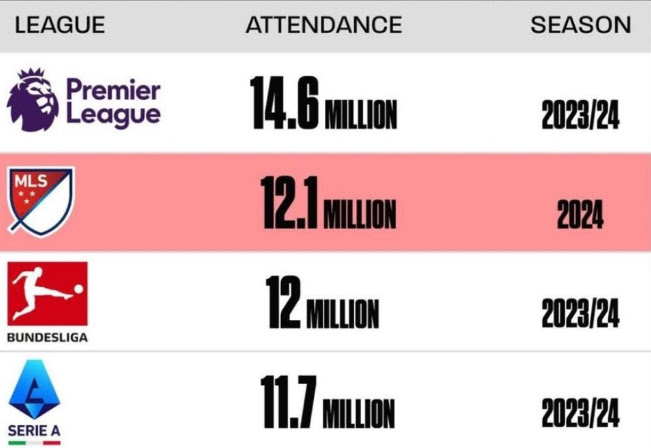League Attendance Claims Missed the Mark with football fans – MLS

At the risk of ruffling a few feathers, here we go…
Let’s talk about a recent claim being discussed in football circles. Major League Soccer (MLS) executives have proudly announced that it’s the second-most attended football league in the world for the season, with 12.1 million fans passing through turnstiles. That puts it ahead of some of Europe’s most celebrated leagues—Bundesliga, Serie A, and La Liga.
It’s an exciting stat, and I can’t deny the numbers are factual—MLS did welcome more fans than those leagues in total and that should be celebrated. But here’s where things get tricky: the context behind those numbers tells a different story.
The MLS plays nearly 200 more games per season than the Bundesliga and around 100 more than the Premier League, this is due to the MLS having 29 clubs to the Premier League’s 20 and the Bundesliga’s 18. That’s not a small detail—it fundamentally alters how we interpret the data.
Let’s put this into perspective using the Bundesliga as a comparison. According to Sports Illustrated, the the average MLS attendance is 23,240 spectators per game, those additional 200 games translate to an extra 4,648,000 attendees overall (23,240 x 200). This creates a substantial advantage for MLS in aggregate attendance charts, making it crucial to account for the number of games when comparing leagues.
When executives of the league share these stats with celebratory statements,
“In a season full of new heights and records, our passionate fans made Major League Soccer the second-most attended soccer league in the world,”
and the Growth manager of the MLS posts the stats with the caption,
“The math is mathing.”
it feels like the intent is to inflate the league’s positioning. Surely we must include all of the math for the math to be mathing?
This approach might resonate with casual fans, but to seasoned football fans in both the US and globally—it feels like a bit of PR spin. And that’s where the problem lies.
Football fans value authenticity above almost anything else. We’re used to debating data, comparing leagues, and sniffing out any attempts to stretch information, we live for finding holes in the arguments of our opponents. When MLS promotes stats like this without explaining the game count disparity, it undermines credibility of their actual achievement, and that’s a shame because the MLS is doing great things.
The response to posts on social media highlights the issue. Many comments pointed out the skewed nature of the data, showing that the perception of the post wasn’t overwhelmingly positive. This included US fans.
For the MLS to keep the momentum in earning international respect—and avoid scepticism which is the enemy of growth— the powers that be should focus on its strengths. For example:
- Average Attendance Per Game
This is the standard benchmark in global football. While MLS per-game averages are still lower than Europe’s top leagues, they’re steadily improving. Franchises like Atlanta United, LAFC, and Seattle Sounders consistently draw impressive crowds. - Fan Engagement and Growth
MLS clubs have created unique, passionate fan cultures. The Portland Timbers and their “Timbers Army,” for instance, rival the energy of European ultras. This is a far more compelling story. - Cultural and Global Impact
The league has consistently made waves globally—Messi’s arrival at Inter Miami, David Beckham’s influence with LA Galaxy and Inter, and even Thierry Henry’s stint with the New York Red Bulls. These moments are what make MLS stand out in the competitive marketing space of world football.
Here’s some friendly advice to the good people at the MLS: global respect isn’t built through selective stats. It’s built by being upfront about where the league stands and what makes it unique.
Football fans aren’t comparing leagues by total attendance, nobody really cares about that; they’re looking at stadium atmospheres and the quality of football on display, both of which the MLS is growing at a good pace and should be proud of.
Other leagues embrace and celebrate their unique identities. Bundesliga fans highlight its affordable ticket prices, and supporter ownership structures when debating others. La Liga leans into its technical flair and storied history, while Premier League fans flex about being the best and most popular league in the world.
MLS has its own strengths: community-driven clubs, big-name signings, and its growing reputation as a league of opportunity. That’s where I believe the executive’s focus should be. Plus it’s in the United States, the land of opportunity and aspiration of many!
To be fair, the attendance numbers aren’t wrong. MLS genuinely had over 12 million fans in attendance this season. That’s a huge achievement and a newsworthy story but it just felt that the intent behind sharing these stats in the way they did was to fool the casuals into thinking the MLS is more competitive than it might actually be.
When league executives post it like that, it comes across as strategic and inauthentic. It fuels dismissiveness instead of admiration.
Adding a self-aware line like, “OK, OK, we may have played 200 more games,” could work wonders in connecting with fans outside the U.S. It would be a good way to get the headline while still being realistic! It shows humour and humility, acknowledging the league’s unique context and youthfulness while celebrating its achievements. This kind of statement invites respect by demonstrating that MLS understands its position and isn’t trying to pull the wool over anybody’s eyes.
I hope this article is taken in the context it was intended. I’m not some footy “euro snob” taking shots at MLS—I spend a lot of time in the US and Canada, and I’ve been to many MLS games, even back in Beckham’s LA Galaxy era. My good friend was a head coach for an MLS club and I’ve represented MLS players. I’ve seen the league evolve over the years, and I’m genuinely excited about its growth and potential.
MLS doesn’t need to stretch the details to impress people. Its real story—of progress, innovation, and cultural impact—is compelling enough. Honest marketing builds trust, and trust builds respect. If MLS executives focus on showcasing its authentic journey, it will continue to grow—not just in attendance but in how the footballing world views it.
Some might read this and think I’m overthinking it, maybe I am, but as someone who has spent years working in sports marketing and pays close attention to these things, I can confidently say it’s often the small details that make a big difference.
Individually, these things won’t slow down MLS’s growth, but we all know the big growth lies in the global TV rights. The sooner the league can shift perception and get the rest of the world onside, the quicker it can achieve its goals.
In case you’re wondering, yes, that pun was intended 
Source: David Skilling





